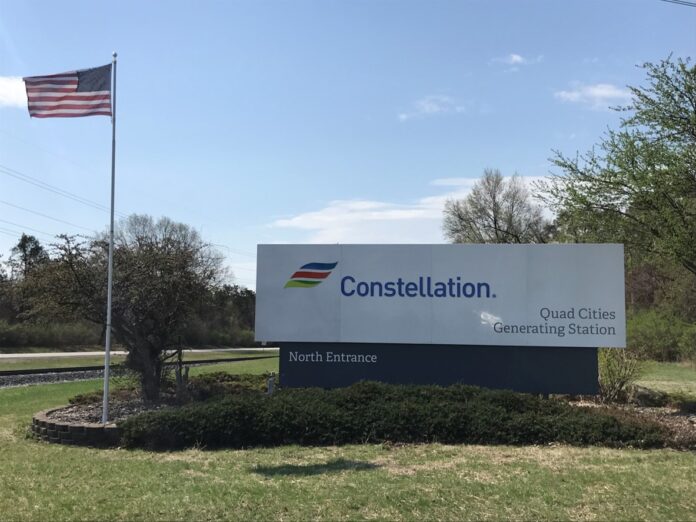
Constellation’s 11 reactors at six Illinois nuclear plants, including two at its Quad Cities Generating Station in Cordova, are positioned to supply uninterrupted carbon-free electricity in what is forecasted to be a hotter than usual summer, the company said.
Constellation, headquartered in Baltimore, Maryland, operates the former Quad Cities Exelon plant and owns 75% of it. MidAmerican Holdings owns the remaining 25% share. Constellation became a standalone publicly traded company in early 2022 after completing its split from Exelon Corp.
In a Constellation news release issued Wednesday, July 12, the energy company said its Illinois fleet will provide energy to the equivalent of more than 8 million homes in Illinois and beyond this summer.
The release said global temperatures already are shattering records for the hottest days ever recorded. The National Oceanic and Atmospheric Administration (NOAA) has predicted above normal temperatures for many regions of the U.S. throughout this summer, as the climate crisis brings on more extreme weather.
According to Constellation, its nuclear fleet has operated at a near-perfect capacity factor of more than 97% over the summer in the past 10 years – meaning its reactors ran at nearly full power every hour of every day through the heat for the past decade.
In anticipation of increased energy demands, Constellation said more than 8,000 workers across the company this spring took part in important technology upgrades and equipment maintenance during refueling outages at Illinois nuclear plants.
“We invested hundreds of millions of dollars this spring in our clean energy centers to ensure they are ready to provide power to millions of Illinois families and workplaces as temperatures soar this summer,” said Dave Rhoades, chief nuclear officer of Constellation, with corporate offices in Warrenville, Illinois. “We produce reliable, carbon-free nuclear power all year round, and during times of high heat when it’s needed most.”
The Quad Cities Generating Station, which now employs 660, was among those plants that had a refueling outage this spring.

The QC station, which began service in 1973, can generate approximately 1,870 megawatts (MW) of zero-emissions electricity. Its two units are licensed to operate until 2032. The Cordova Quad Cities Generating Station also is home to the only privately-owned fish hatchery on the Mississippi River and has raised and released millions of healthy fish.
During the company’s scheduled outages, workers replaced or refurbished dozens of pumps and motors, performed quality assurance inspections on reactor and fuel components and completed tens of thousands of other technical tasks to help the power plants provide uninterrupted electricity for up to 24 straight months.
The outage projects also brought a welcome boost to employment and retail activity in the communities near the facilities. Thousands of skilled electricians, pipefitters, welders, carpenters, laborers, steamfitters and other tradespeople come to the nuclear sites from across the country to perform inspections, tests and maintenance activities.
“NABTU applauds Constellation’s continuous commitment to operational excellence,” Sean McGarvey, president of North America’s Building Trades Unions (NABTU), said in the release. “Constellation’s refueling outages provide family-sustaining jobs for thousands of NABTU skilled craft professionals. Our workers are proud to help build and maintain these critical projects and increase reliability of continuous affordable power for thousands of American families, especially during the hottest months of the year.”
Constellation invests billions of dollars in its plants every decade, replacing and upgrading equipment during refueling outages and at other times, so they can be operated safely for up to 80 years.
“Our precise scheduling for important upgrades, maintenance activities and technical inspections ensures our units are only briefly offline during periods of lower power demand in the spring,” said Tim Hanley, Constellation’s chief operating officer.
Landmark legislation passed in Illinois in 2021 – the Climate and Equitable Jobs Act (CEJA) – saved three of the state’s nuclear plants from early retirement, including the Quad Cities station, while preserving tens of thousands of jobs and preventing an increase in pollution and energy costs.
In 2022, Congress passed the Inflation Reduction Act (IRA), which provides a base level of support for nuclear energy nationwide. Both pieces of legislation are enabling the continued investment in and operation of Constellation’s nuclear fleet, the company said.




